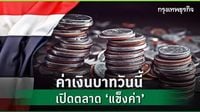On May 6, 2025, the Thai baht opened at 32.93 baht to the dollar, showing a slight appreciation from the previous week's close of 33.05 baht per dollar. Mr. Poon Panichpibool, a market strategist at Krungthai GLOBAL MARKETS, noted that the baht is expected to trade within a range of 32.85-33.05 baht to the dollar today, with a broader weekly range anticipated between 32.75 and 33.35 baht per dollar. This shift comes amidst ongoing uncertainties in international trade negotiations, particularly with the United States and China, which have influenced market sentiments.
The dollar/baht exchange rate is currently in a Sideways Down pattern, with a targeted movement between 32.81 and 33.15 baht to the dollar. This trend aligns with recent positive economic data, including better-than-expected Nonfarm Payrolls and ISM Services PMI reports released in April. These indicators have provided some support for the dollar, even as the baht strengthens.
Additionally, the recent rebound in gold prices has contributed to the baht's appreciation. Gold (XAUUSD) has surged by over $100 per ounce, which has encouraged investors to adopt a 'Buy on Dip' strategy in the stock market. However, the market remains cautious due to the uncertainties surrounding U.S. trade policies, particularly as they relate to China.
Market analysts suggest that while the baht may strengthen further, it could also face downward pressure due to dividend payouts to foreign investors. The dollar is expected to maintain some strength as long as market sentiment remains open to risk, especially with the Federal Reserve (Fed) indicating no immediate plans to cut interest rates.
Looking ahead, investors are advised to monitor upcoming meetings of the Federal Open Market Committee (FOMC) and the Bank of England (BOE), as well as corporate earnings reports which could significantly influence market dynamics. The Fed is anticipated to keep interest rates steady at 4.25-4.50% during its next meeting, with market participants looking for insights on future monetary policy adjustments from Fed Chair Jerome Powell during the press conference.
In Europe, the BOE is also expected to reduce rates by 25 basis points to 4.25% in an effort to bolster the UK economy amid global trade uncertainties. Analysts believe there is a 70% chance of the BOE implementing four additional rate cuts this year.
In Asia, the market is keenly awaiting the Caixin Services PMI report for April, which will provide insights into the economic health of smaller and medium-sized enterprises in China. This report will be crucial in assessing the impact of U.S. trade policies on international trade flows.
Meanwhile, in Thailand, inflation is projected to contract to -0.1% year-on-year in April, primarily due to falling energy prices. Despite this negative inflation reading, it is not expected to prompt the Bank of Thailand (BOT) to tighten monetary policy further, as the central bank does not anticipate a deflationary environment.
As for the baht's outlook, while it has shown strength recently, it may experience fluctuations and could weaken slightly in the near term. Analysts predict that the baht could stabilize around 33.00 baht to the dollar between June and September 2025, influenced by capital flows and easing monetary policies.
In the cryptocurrency market, Bitcoin's price has also seen a minor increase of 0.43% on May 6, reaching $94,726, or approximately 3,118,379.92 baht. Other digital currencies such as Ethereum (ETH) rose by 0.55%, while Tether (USDT) fell slightly by 0.02%. Overall, the crypto market remains volatile, with various factors impacting price movements.
As for the broader economic landscape, the Thai government is preparing measures to stimulate the economy in response to ongoing global trade tensions. Prime Minister Paetongtarn Shinawatra emphasized the need for confidence in navigating these challenges, highlighting initiatives aimed at boosting domestic revenue through entertainment projects.
Furthermore, the Ministry of Finance has projected Thailand's economic growth for 2025 at 2.1%, with a range between 1.6% and 2.6%, a decrease from previous estimates of 3%. This revision reflects the pressures of global trade dynamics and the impact of U.S. import tax policies.
In light of these developments, the government is taking proactive steps to manage the economic situation, including negotiations with the U.S. and expediting budget expenditures for the remainder of 2025. This includes a focus on supporting vulnerable groups affected by economic fluctuations.
Overall, the economic outlook for Thailand remains cautious, with various factors influencing both the local currency and broader economic health. Stakeholders are advised to remain vigilant and adaptable as the situation evolves.



